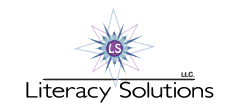
 |
Instruction, Training, Technology |
|||
| Welcome | Evaluation | Consulting | Instruction | |
|
For Email Marketing you can trust
 |
Literacy Solutions Evaluation ServicesIn-depth Diagnostic Educational Evaluation
At Literacy Solutions, we thoroughly investigate a student's literacy skills and education program, assess the student's progress and potential, identify methods for realizing that potential, then present our findings in five major categories:
In the course of evaluating each student, Literacy Solutions uses a variety of standardized tests to gauge skills in reading, phonological processing, writing, and information processing. In addition, Literacy Solutions examines the student's graphomotor (penmanship) skills, ideation (narrative ability), and writing organization. Results, observations, and program recommendations are combined in a formal Diagnostic Educational Evaluation report that communicates to family, teachers and educational administrators the student's needs for an appropriate program. A sample report is available on this website. Assistive-technology Assessment
When educational evaluation reveals that assistive technology is needed, Literacy Solutions assesses the student's comfort with and potential benefit from a wide range of assistive technologies. Students are evaluated along the spectrum of low-tech to high-tech assistance in all areas of academic need. This can include various software and hardware that provide assistive functions such as automated note-taking, word-prediction software, assistive/augmentative communication devices, speech-recognition software, electronic spellers or scanning pens. Augmentative and Alternative Communication
People with severe speech or language problems may need AAC (Augmentative and Alternative Communication), either to supplement their existing speech or to replace speech that is not functional. Augmentative and alternative communication (AAC) covers all forms of communication (other than oral speech) used to express thoughts, needs, wants, and ideas. AAC includes lower technology devices as well as higher technology devices. Augmentative communication aids can increase an individual's social interaction, school performance, and feelings of self-worth. Effective evaluation can break the cycle of frustration
|